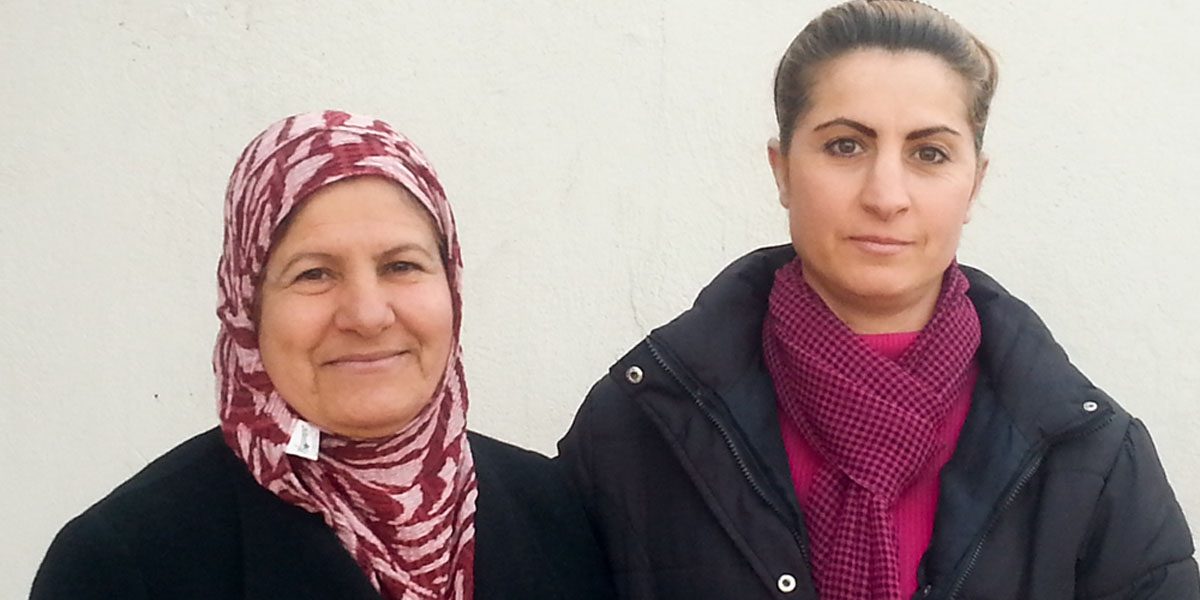Iraq: A Tale of Two Women
03 February 2016

In the events hall of the Jesuit Refugee Service Community Center in Ozal, two women, Fidá* and Souad* are sitting and smiling while they listen attentively to the psychologist who is giving a lecture for JRS’s awareness sessions on how to manage stress. These sessions are offered to around 40 women living in Ozal, a residential complex in northern Iraq where about 1,700 families of internally displaced people live.
Fidá is a young Christian mother originally from the countryside in Northern Iraq, and Souad a spry looking, old Muslim lady from Falluja.Fidá and Souad accepted to meet me after the sessions to tell me about themselves. In the safe space offered by JRS’ women’s group and other psychosocial activities, Fidá and Souad became friends. “How is your life now in Ozal?” I ask the women.
Fidá answers first. “Thank God we have some stability, but not the normal kind. We live three families to a house. We had to start our lives from zero, since we hadn’t brought much money with us when we ran away from ISIS. But thanks God, we as Christians had the help of the Church that pays our rent. The issue is that we don’t know what will happen in the future. They say that in April many more people will be displaced. There are rumors about the government going bankrupt. It seems it will definitively stop the already-delayed payment of salaries.”
Souad is not very convinced of the reliability of the information, and she reassures Fidá, who meanwhile starts listing the positive sides of her life today. The neighbors are good people, and – she says with a simple wisdom – “after all, if you want problems, you make problems from everything; if you don’t want problems you find a way to live in peace. Our neighbors are people of the second kind, thank God.”
Fidá comes from a small village in the area of Hamdanya. When ISIS fighters entered her town, she fled together with her family. At the beginning they stayed her relatives’ house, but they themselves are displaced, so then Fidá and her family had to move out and found shelter in the Marhaba Hall, a big room belonging to the Church where another 213 people were hosted.
In that room with no internal partitions, and therefore, no privacy, Fidá in two months learned all the stories of the other families, each one different and terrible in its own way. A particularly tragic one was of a family who lost their little daughter who was kidnapped by ISIS.
After another two months of moving from one place to another, they finally arrived to Ozal, where they found JRS’ dynamic and busy community center. “Here,” she says, “I especially enjoy the awareness sessions with the doctors and the women’s support group. It is first of all, a change of routine and a break from our life here.”
Remembering my first encounter with Fidá, I ask her “You told me that you spent six months crying and then suddenly you decided to be strong and carry on. What changed in you?”
“There is nothing impossible for God. One day we will go back, but even in this situation here, God is present, everywhere,” Fidá says.
“How do you know that?” I ask.
“Did I tell you about my little daughter?” Fidá asks.
Fidá recalls that terrible night. “When we were about to leave the house, in the midst of fear and hurry, Marine, my six-year-old girl said ‘God will save us.’ I asked her what she was talking about. And she replied, ‘well you remember Noah and the ship? There was a ship where all the animals had to enter in order to be saved. Well, God will just open the doors of the ship for us, and we’ll be safe!'”
“I mean, if a six-year-old is capable of such wisdom, it means that God is here!” Fidá continues.
At this point, the old lady Souad, who during the story has kept nodding in sign of approval, begins to tell her own story. A serene smile stays on her face even when recalling the horrific times in Falluja.
“There were bombardments every day. Whoever had the possibility, (she makes a hand sign indicating ‘money’) left. Our neighbors had missiles dropped on their homes; it was a nightmare. ISIS took possession of a library. They emptied it and they stored there their machineries. One night something went wrong, and the heavy artillery which was kept inside the library started to blow up. We thought they were bombarding.
In Ozal, I made new friends. I go to the market with them; we invite each other to our homes. When I am sad, I go to my friend Nazek’s house. Now I have Christian friends!” says Souad with a childlike smile,. “I only recall having Christian friends back in high school, in Baghdad, but then I got married and I moved to Falluja. There, apart from the Christian neighborhood al-Habbanya, there are no Christians around.
Now Christian friends invite me to their celebration — the most recent one a birthday party,” she says. The two women look at each other with a conspiratorial smile and then they convene: “it was fun!”


